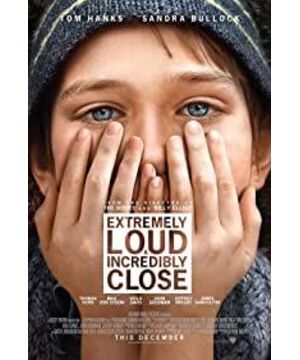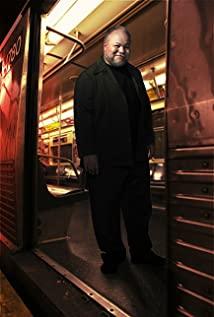There are three important suspense or turning points in the process of finding the secret of the key: one is the appearance of the grandfather, accompanied by the boy Oscar. Can't speak, can only communicate with pen and paper - there must be an important secret behind it; the second is the black couple they found for the first time, but they didn't have the opportunity to tell Oscar until the end of the film that they were looking for Oscar's key - also the father The secrets left, one is looking for the lock, the other is looking for the key; the third is that the mother finally told Oscar that she had been secretly visiting those BLACKs in advance.
He spent a lot of time playing exploration games with Oscar, cultivating his scientific spirit and exercising his ability to communicate with people. So dear father, but disappeared in 911, leaving only six paragraphs of messages, and an unfinished journey of exploration. It is difficult for anyone to accept such a fate. It's just the precocious Oscar who chose to start an exploratory journey left by his imaginary father in order to retain his lost father.
It is the same mother's love as the father's love that finally solves this pain. Here, the screenwriter is particularly "heart" to let the mother continue the father's way of exploring the game.
Superfluous smart design.
In fact, the first two characters may be enough - the pain you endure is not unique in the world. What you have is what others have lost. I like these two paragraphs. Going to read the original again.
In addition to the story, the movie graphics and music are also very good. There are two scenes that left a deep impression on me. One is the grandfather and grandson coming out of the bar and walking through a red wall, which is very beautiful. The other is Oscar pouring out the secrets in his heart to the grandfather he met for the first time and he didn't know his identity. This clip is great.
The color in the moving story "Out of My World" is equally impressive, and director Stephen Dedley is really good at dealing with the story and the picture.
There are two main reasons why people give this film a low score. One is that the director is British and does not understand the trauma of 9/11. The second is that he doesn't like the rude or even hysterical boy Oscar.
The film is entirely based on Oscar's perspective, with a lot of first-person narration. To be fair, sometimes the boy really overplayed it (it can be compared with Grandpa's role, he has won a lot of nominations for best male supporting roles for this role), but he basically showed Zao Hui's character with a communication barrier ( Some people have defended Oscar by saying he has Asperger's syndrome, looked it up online and it doesn't seem to count).
As for the first reason, Americans are not commenting on the film itself.
Cinema is an expression. Subjective preferences are important, but should not be incorporated into the base score for the film.
Attachment: Clinical manifestations of Asperger’s syndrome
1. Patients with interpersonal communication difficulties
are willing to communicate with others and like to play with their peers, but lack communication skills, do not understand non-verbal information such as facial expressions and body movements, and use rigid communication methods , rigid and stylized, so it is difficult to form and maintain good interpersonal relationships, to develop friendships, to respond flexibly to various situations, and to be often isolated by peers. The difference from the performance of children with autism is that people with autism are withdrawn, they do not seem to be interested in people around them, and do not actively connect with peers, but people with Asperger's syndrome often desire and even try to connect with other people. , but lack the skills to do so.
2. Difficulty in language communication
Although the patient's language development is normal and the expression is fluent, the ability to use language to communicate is poor, the ability to observe words and expressions during the conversation is poor, and he does not pay attention to the other party's reaction, regardless of whether the other party is interested in the content of the conversation. Don't care about other people's feelings. More written language is used in the conversation, and the words are carefully written, giving people a feeling of being old-fashioned, rigid and exaggerated. For the conversation of the other party, the patient can only understand short and clear sentences, and it is difficult to understand sentences with humorous, metaphorical and pun meanings.
3. The behavior pattern is rigid and ritualized, and the hobbies are limited
The stereotyped ritualization of behavioral patterns is manifested as stubbornly maintaining routines for routine activities, such as having to take the same route to school, and being irritable if there is a change in the day's curriculum, or if the time is delayed by traffic jams. Some patients eat the same meals every day, defecate at a fixed time and place, go to bed regularly, use only the same quilt and pillow, and cover their eyes with a handkerchief when falling asleep. Once these behavioral activities are changed, the patient will show anxiety and irritability. Patients often have some special hobbies and collections, such as memorizing train timetables, lottery winners, the heights of famous mountains or buildings, and collecting phone cards, which are rather eccentric. These interests should be encouraged and exploited in patients to pursue related careers or research in adulthood.
4. Clumsy movement
In addition to the diagnostic basis mentioned above, there is a symptom that is related to the performance of Asperger's syndrome patients rather than the diagnosis basis, that is, delayed motor development and clumsiness. People with Asperger's syndrome may have a personal history of lagging motor skills, such as learning to ride a bicycle, catch a ball, and open a can later than their peers. Often they are inflexible, with rigid gait, erratic posture, poor motor skills, and significant deficits in visual-motor coordination.
View more about Extremely Loud & Incredibly Close reviews











